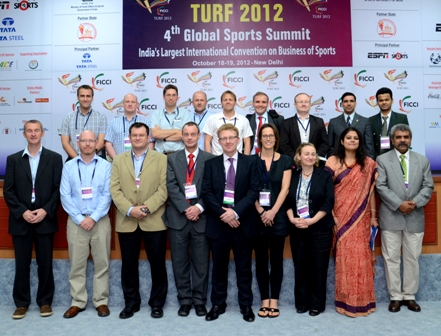
Turf 2012: the roll call of speakers and sponsors
Challenges on a bigger scale: India’s steps towards a national sport system
Ben Gittus reports from TURF 2012, an improbably titled convention looking at all aspects of sport in India, and explains the contribution of UK-based personnel to the debate.
How to develop a successful sports system for a developing nation of 1.2 billion people is a question those of us involved in sport in the UK will never have to consider but that is precisely the challenge facing sports policy-makers and professionals in India.
These sports policy-makers and professionals recently came together in New Delhi at TURF 2012, India’s largest convention on the business of sport, and 14 sport and education professionals from the UK were able to attend and contribute to this landmark event as part of a delegation led by SkillsActive.
Across the world there are three pillars of sports policy: school sport, participation and elite sport. These are as evident in India as they are in the UK and at TURF 2012 there was discussion around the buzzwords and themes we are familiar with in the UK: legacy, infrastructure, coach education, capacity-building, investment, athlete support and skills development. No country will ever have the perfect system but bringing together and developing these elements has contributed to the improvements and successes that have occurred in British sport. There was a view among the UK delegates that Indian sport is still right at the start of the process of identifying and developing all the components that will produce a system to take Indian sport forward.
Although Indian sport may not have the same history of system-building as the UK (and just six medals at London 2012 points to more work to do to develop Indian elite sport) the two words that sum up the findings of the conference are 'potential' and 'opportunity'.
Cricket clearly remains a mainstay of the sports industry in India but the growing diversity and maturity of the sector is demonstrated by the 2010 Commonwealth Games, Formula 1 and the recently inaugurated I League in soccer. Foreign investment in Indian sport is increasing every year and if increased interest in and popularity of sport can be coupled with improved organisation, co-ordination and some semblance of a system there is no reason why India cannot gain the societal, economic and health benefits of sport while climbing the medal and ranking tables. It should also be noted that there is a strong willingness to work with and learn from other countries to accelerate the pace of development.
The conference discussed a number of the specific challenges for Indian sport, including: the need to change changing the mindset and attitude to sport so participation or aiming for a career in sport is not looked down on by parents or society; the need for institutional capacity-building and skills development so that a wider range of courses can be offered to create a qualified and skilled workforce (the formation of a sector skills council is a possibility); and the need for data collection because more information is needed on the baseline position of sport in the country. The conference was organised by the sports division of the Federation of India Chambers of Commerce and Industry (FICCI) and it is hoped FICCI will take a lead role in the development of the sports industry.
Among the most interesting sessions at the conference were the sessions on infrastructure and legacy planning, in which Scott Hartley from Press Red sat on the panel and received some tough questioning from the audience, and on institutional capacity- building, in which I outlined the components of a skills system in sport and promoted global knowledge partnerships between UK and Indian institutions. Other sessions of note included Mission Rank 100 where the aim to move from position 169 in the FIFA soccer rankings to enter the top 100 was debated. Insights in this discussion came from a range of organisations, among them Barcelona FC who have opened an academy in New Delhi. Questions included whether their aim was to develop Indian soccer or increase the club’s fan base. The session titled Focus on Punjab State looked at how the Punjab is making a major investment with the intention of becoming a powerhouse in Indian sport, while another session, titled The Role of Bollywood, looked at the contribution of the film industry in changing attitudes towards sport. At the close SkillsActive’s David Henwood summed up the international perspective of the conference as part of the valedictory session.
Along the way dedicated business-to-business meetings were arranged for seven UK universities – Glamorgan, UCP MARJON, Liverpool John Moores, Chester, Chichester, Birmingham and Bournemouth – with Indian institutions and we hope these will result in ongoing work and partnerships.
The end of the second day brought reflections on a stimulating, enjoyable and successful conference. There is massive potential in Indian sport and many possibilities for the UK delegates to remain involved and provide support to the process of development and improvement in Indian sport, particularly around sport education, and possibly help with the nascent development of an Indian sport system.
Ben Gittus is a director and consultant with EOSE Services
The Leisure Review, December 2012
© Copyright of all material on this site is retained by The Leisure Review or the individual contributors where stated. Contact The Leisure Review for details.
Download a pdf version of this article for printing
